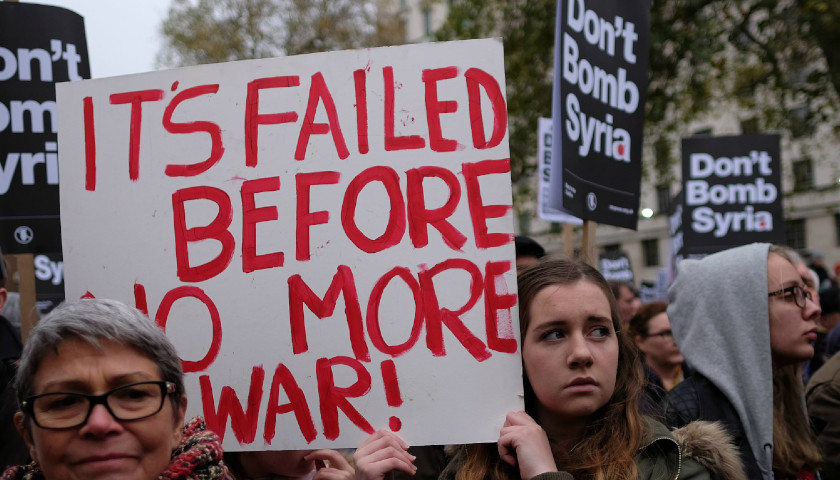by Austin Mulka
Yesterday I posted a status in unequivocal support of President Trump’s recent decision to pull out of Syria. The post elicited the abhorrent wails of the president’s purported supporters, one of whom denounced me as a supporter of “child killers.”

As baseless as the claim was, empathizing with an opponent’s argument is the most efficient means of coming to mutual understandings of disagreement.
Ultimately, those in opposition to pulling out of Syria firmly believe that military intervention is a principled position against the murder of children. As such, any opposition to this position, such as my own, must indicate its reciprocal support.
Insofar as I am unequivocally against the murder of children, I hope to explain why military intervention is not the most effective means of fighting the Islamic regime and three alternatives to war with proven effectiveness.
Journalism
First and foremost, I would like to state that I am not a supporter of the Islamic regime in Syria. In The Home That was Our Country: A Memoir of Syria, Arab-American journalist Alia Malek details her first-hand accounts of horrendous acts and grievances by the Syrian regime.
Having lived in both Syria and the United States, Malek endures the conflict a little like a child with spitefully divorced parents. She is able to love and understand the good and bad of both countries even though they are unable to love and understand each other.
As an American, Malek experiences a lot of difficulties when attempting to justify the decisions of the United States to the Syrian public:
I was confronted with people who engaged in logical gymnastics to deny that the demonstrations might have been peaceful and civil and native to Syria.
“So what are they?” I would ask.
“The US, orchestrating everything happening here and in the region.”
Any retort I gave was inevitably answered with, “Didn’t the US lie about weapons of mass destruction so it could invade Iraq, which allowed violent chaos to explode there?
That’s where the conversation usually ended, because I could not deny that was true.
There seemed to be little room for parallel truths: that the United States had lied to invade Iraq and that Assad did not legitimately hold power; that the United States had supported Israel’s brutalization of Arabs and that Syria needed reform; that Islamophobia informed to some degree US foreign policy and that the Assad regime had tortured children from Dara’a who had scribbled political graffiti.
Explaining the United States to people in the Arab world has never been easy. I had often been asked versions of the question, “How can the US have such great ideals but have such terrible foreign policy?”
Despite Malek’s frustration, she and journalists around the world, having the ability to view these conflicts through multiple lenses, are crucial to helping educate others on the complexities of foreign conflict.
Comedy
Many of those fighting the regime in the Middle East believe comedy to be one of the best means by which to promote more progressive values. Consider, for example, the effect sitcoms and stand-up comedy had in helping to eradicate outdated norms in Western culture.
In regards to the Middle East, one of the best comedy groups promoting freedom-minded values is the Axis of Evil Comedy Tour. The tour features four Middle Eastern comedians with guest comedians, and their name derives from a speech given by President George W. Bush that labeled Iraq, Iran, and North Korea as the “Axis of Evil.”
In March 2007, Time Magazine, which interviewed the group in a featured publication, described their content as “warfare by humorous means.”
You wouldn’t support bombing Detroit to protest the sex trade, so why support bombing the Middle East to protest “child murderers”? Fighting fire with fire seldom works out in the favor of the user. The means by which comedy is able to critique cultural values in a light-hearted manner is like water to the flames of authoritarian regimes.
Promoting Freedom
As shown by Gandhi, one of the best means by which to calmly and peacefully resolve potential abuses of power is through freedom. In exercising one’s natural rights to autonomy, there is little authority can do to abuse control outside of resorting to violent measures.
I contend that encouraging and praising acts of freedom by citizens in the Middle East is an effective method of fighting authoritarian rule. In a day and age in which people are able to communicate with, and receive support from, millions across the world, the more the citizen’s freedoms are supported, the more willing they are to commit acts of civil unrest and public defiance.
Attacking the culture or blaming the religion for the power abuses of the regime does not stop tyranny at its source. Moreover, it makes citizens of faith exhibit a Stockholm Syndrome-like mentality towards the regime.
In switching the emphasis of attack towards the specific violation by authoritative abuse on natural rights, citizens of faith might more easily come together, as Muslims and Arabs, in defiance of the regime.
– – –
Austin Mulka is a musician, writer, martial artist, and liberty activist from Dearborn Heights, Michigan. He has a degree in English from the University of Michigan and is pursuing a graduate degree in evolutionary psychology.
Photo “Syrian War Protests” by Alisdare Hickson. CC BY-SA 2.0.




